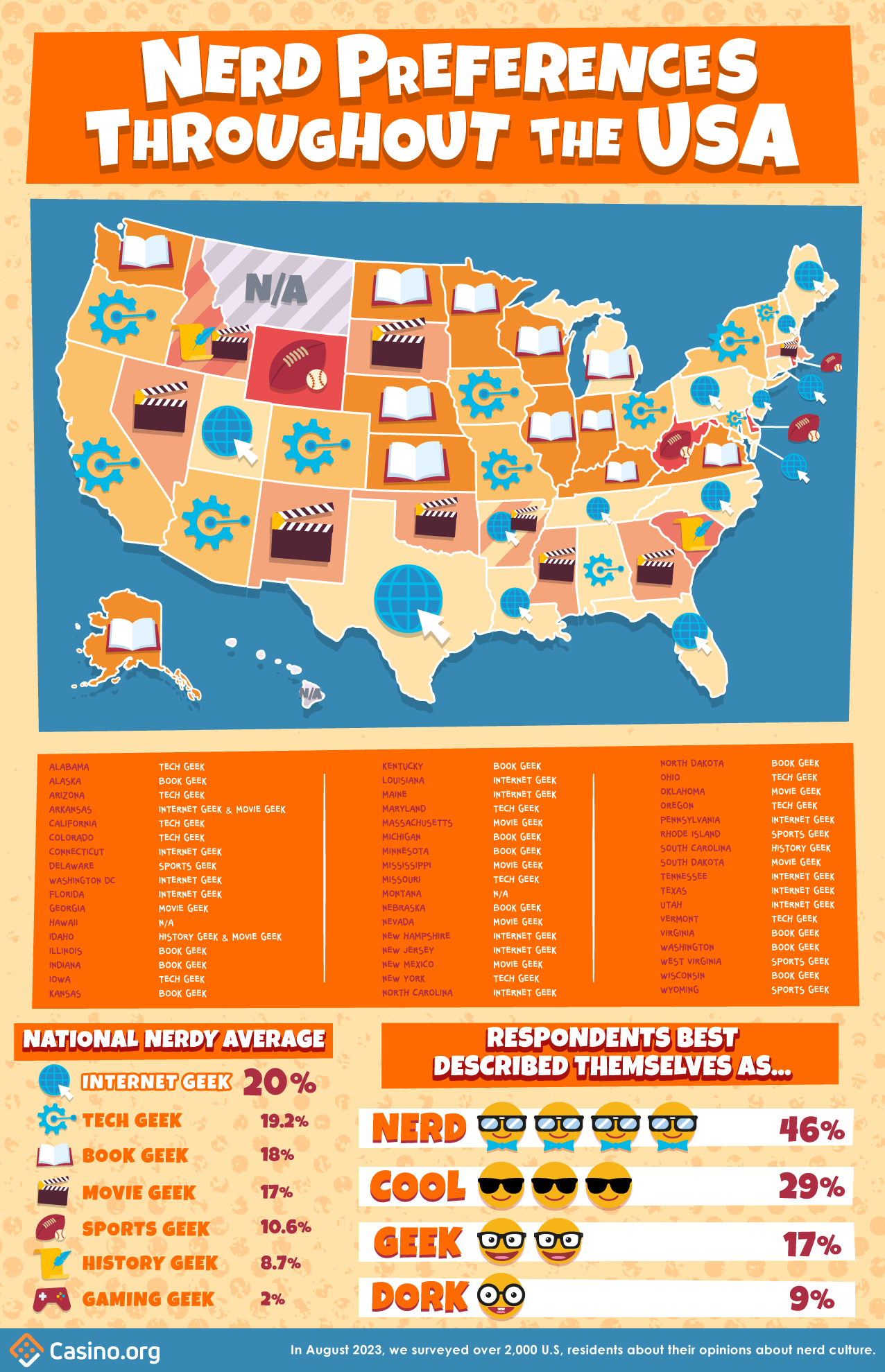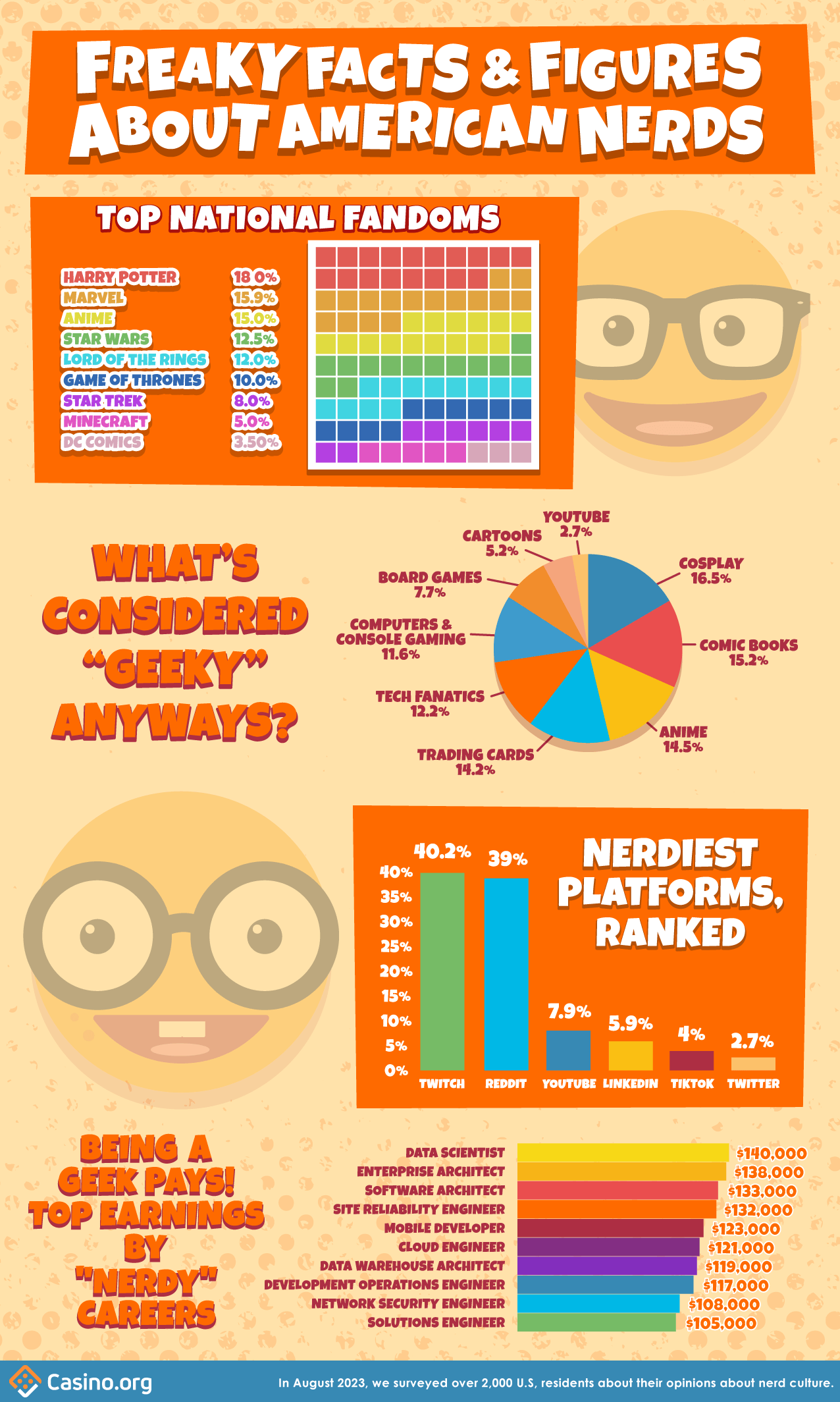Exploring Nerd Culture: A Comprehensive National Survey on Modern Geekdom
Nerd culture has undergone a remarkable transformation, evolving from a source of playground taunts to a mainstream cultural force that shapes technology, entertainment, and even the workplace. To understand how this cultural shift is playing out across America, a nationwide survey of 2,000 adults explored perceptions of nerd identity, the impact of fandoms, regional hotspots for geekiness, and which careers and hobbies attract the nerdiest crowds.
Key Insights from the National Nerd Culture Survey
The survey revealed several standout findings about American nerds and the communities they form:
- "Internet geeks" emerged as the most common self-identified group, capturing the top spot among niche interests.
- Austin, Texas, was named the country's nerdiest city, while Rhode Island claimed victory as the state with the highest percentage of self-described nerds.
- Cosplay rose as the leading nerdy pastime.
- The legal profession topped the charts for industries with the most self-identified nerds, with 85% of workers embracing their inner "dork."
Mapping Nerd Identity Across the United States
Not all nerds share the same passions-some are die-hard techies, others are book lovers or lifelong Trekkies. To map the nation's diverse geek subcultures, the survey broke down responses by state, revealing where nerd pride runs highest.

When asked to pick the category that best described their geekiness, 20% pointed to "internet geeks," making this the nation's dominant nerd archetype. Tech geeks followed closely behind, with bookworms in third place.
But which states boast the most-and least-nerd-friendly residents?
- Rhode Island topped the list, with all surveyed residents identifying somewhere on the geek spectrum.
- Kentucky followed in second place, where 94% leaned into a geeky label.
- Iowa took third, with 90% embracing the nerd identity.
Conversely, Maine residents showed the least nerd pride, with 75% of respondents rejecting the "nerd" classification altogether, while D.C. and Delaware shared second place for "coolness."
America's Geektastic Cities: Where Nerds Cluster
Zooming in, the survey pinpointed the urban centers with the greatest concentration of self-proclaimed nerds. These are the top 10 most nerd-centric cities across the nation:
- Austin, Texas
- Columbus, Ohio
- Arlington, Virginia
- Milwaukee, Wisconsin
- Burlington, Vermont
- Richmond, Virginia
- Salem, Massachusetts
- Newark, New York
- Las Cruces, New Mexico
- Knoxville, Tennessee
From Austin's legendary music and tech communities to the political wonks of Arlington, these cities offer diverse havens for geek culture fans. Virginia stands out for having two cities on the list, with the rest spread across multiple regions.
Professions with the Most Nerds: Challenging Stereotypes
Nerds aren't confined to computers and coding-they can be found in workplaces nationwide. While technology might seem like an obvious magnet for nerdy personalities, the data tells a broader story.
The job sectors with the highest percentages of self-identified nerds are:
- Law and Legal: 85%
- Marketing and Media: 80%
- Public Services and Administration: 78%
Interestingly, nearly one-third of IT professionals (30%) did not consider themselves nerdy, suggesting that "cool" and "techie" are not mutually exclusive.

What Defines Nerdy Hobbies and Fandoms?
What activities earn someone the nerd label? The survey asked participants to rank hobbies by their level of perceived nerdiness.
- Cosplay emerged as the top nerdy pursuit, with nearly 70% pegging it as the quintessential geek activity.
- Comic book reading followed at 61%, while anime enjoyed its own strong nerd association at 58%.
Passion for fandoms is another marker of nerd identity. The most popular fan bases were:
- Harry Potter, leading the nation with an estimated $25 billion franchise value.
- The Marvel Cinematic Universe.
- Anime fandom, echoing its high nerdiness rating among hobbies.
Careers for Nerds: Where Brainpower Meets Big Paychecks
Famous figures like Jeff Bezos, Elon Musk, Steve Jobs, and Bill Gates have proven that nerdy skills can lead to immense financial success. Survey data highlighted the industries and roles where nerds enjoy lucrative salaries. The highest-earning "nerdy jobs" include:
| Job Title | Approximate Average Salary (USD) |
|---|---|
| Data Scientist | $140,000 |
| Enterprise Architect | $138,000 |
| Software Architect | $133,000 |
| Site Reliability Engineer | $132,000 |
| Mobile Developer | $123,000 |
| Cloud Engineer | $121,000 |
| Data Warehouse Architect | $119,000 |
| Development Operations Engineer | $117,000 |
| Network Security Engineer | $108,000 |
| Solutions Engineer | $105,000 |
Technology and data science roles dominate the list, confirming that nerdiness-paired with expertise-can unlock high earning potential.
Reframing Nerd Identity and Celebrating Geek Pride
The results are clear: old stereotypes have missed the mark. Nerds today are vital contributors to culture, business, and innovation. They lead successful careers, shape billion-dollar fandoms, and help define trends. From deep knowledge of digital worlds to mastery of statistics or fantasy lore, modern nerds span every interest and walk of life.
As Geek Pride Day approaches each May 25, it’s the perfect time to embrace your quirks, bring out your Dungeons & Dragons dice, and celebrate the many forms of geekiness that enrich our world.
Survey Background and Methodology
The data was collected from a survey of over 2,000 American adults in May 2024, incorporating a broad spectrum of ages (18-70) and identities. The sample included 51% men, 47.1% women, and 1.9% transgender or non-binary participants. Results were updated and reviewed in May 2024 for accuracy.
Usage and Attribution
You are welcome to use the findings or visuals from this article for non-commercial projects. Please credit the source with a link to this page to acknowledge the original researchers.













